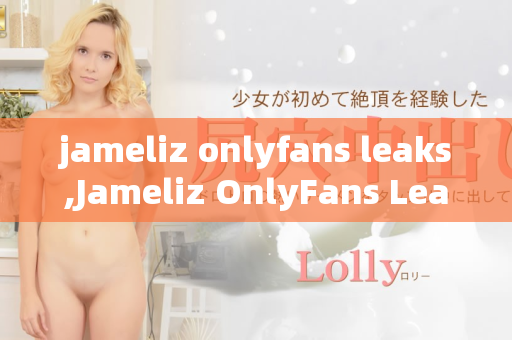
The world of social media has undergone a significant transformation in recent years, with platforms like OnlyFans emerging as key players in the way creators connect with their audiences. One such creator, Jameliz, has garnered considerable attention for her exclusive content on OnlyFans. However, the phenomenon of content leaks has raised questions about privacy and the sustainability of such platforms. In this article, we delve into the allure of Jameliz's content, the implications of leaks, and what it means for both creators and consumers.
Jameliz has made a name for herself by offering a unique blend of tantalizing content that caters to a diverse audience. Subscribers are drawn to her charismatic personality, stunning visuals, and the promise of exclusive behind-the-scenes glimpses into her life. The intimate nature of OnlyFans allows creators like Jameliz to form a more personal connection with their fans, which can lead to loyal subscribers willing to pay for access to exclusive materials that are often unavailable elsewhere. This model has redefined how content creators monetize their work, allowing them to take control of their own narratives.
However, with the rise of such platforms comes the dark side of content sharing: leaks. The term "OnlyFans leaks" refers to unauthorized dissemination of exclusive content, which can happen through various means. Unfortunately, Jameliz has not been immune to this issue. Leaks can severely impact a creator's income, as many potential subscribers may opt to seek out leaked content for free instead of supporting the creator directly. This not only undermines the financial stability of creators but also raises ethical concerns about consent and ownership of digital content.
When exclusive content leaks, it often leads to an overwhelming sense of violation for creators like Jameliz. They invest time, effort, and creativity into producing content that is meant to be shared with a specific audience, and when that content is leaked, it feels like a breach of trust. Furthermore, the psychological impact of having one’s personal content exposed without permission can be daunting. Creators may experience anxiety and stress as they grapple with the implications of losing control over their work. This raises important questions about how the industry can protect its creators and what measures can be taken to prevent leaks from occurring in the first place.
Despite these challenges, many creators strive to adapt and find innovative solutions to safeguard their content. Some have turned to advanced encryption methods, while others involve community engagement to create a more loyal subscriber base that values and respects their work. Jameliz, for instance, may choose to embrace these strategies to mitigate the risks associated with leaks, focusing on building a strong community around her content that champions ethical consumption. This proactive approach not only helps secure her income but also reinforces the importance of supporting creators directly, fostering an environment where artists can thrive without the threat of unauthorized distribution.
In conclusion, the situation surrounding Jameliz's OnlyFans content reflects a broader shift in the landscape of digital content creation. While the allure of exclusive content can draw in subscribers, the threat of leaks poses significant challenges. For Jameliz and many like her, navigating this complex terrain requires a combination of creativity, resilience, and community engagement. As the industry continues to evolve, it remains crucial for both creators and consumers to advocate for ethical practices that uphold the integrity of digital content and the rights of those who create it.









